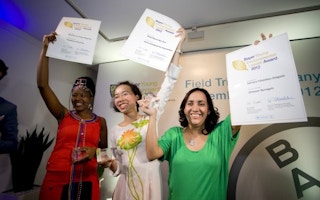Young Vietnamese Dang Huyn Mai Anh was watching a TV programme about environmental programmes for youth when her mum turned to her and asked, “Why are there environmental projects only for young people? What about mothers and housewives?”
It was a question that so bothered the 20-year old undergraduate that she decided to put together a Green Handbook just for homemakers like her mother. Containing practical tips on how to save energy and water, recycle plastic containers and bottles, minimise food waste and even ways to re-use beauty products, the 16-page handbook, which is available in print and online, has won over Anh’s mum as well as thousands of other housewives in Ho Chi Minh City’s Phu Nhuan district.
Thanks to this effort, Anh bagged one of three ‘Bayer Young Environmental Leader Awards’, which honours environmental projects that demonstrate outstanding innovation, impact and sustainability.
Selected by an expert panel from German chemical giant Bayer, the United Nations Environment Programme (UNEP), Tunza magazine (UNEP’s publication for youth) and the UNEP/Wuppertal Institute Collaborating Centre on Sustainable Consumption and Production, the Awards were presented at the end of a week-long study trip for fifty Bayer Young Environmental Envoys (BYEE) to Germany earlier this month.
The judges were also won over by two other projects marrying environmental and socio-economic needs.
Mwanyuma Hope Mugambi, a 23-year old student of environmental sciences from Mombasa, Kenya, was recognised for a programme that teaches young women in her community to collect and recycle old polythene bags into handbags, purses and mats.
Meanwhile, Adriana Maria Villalobos Delgado, a 20-year old from Heredia, Costa Rica, tapped on her chemistry major to turn shrimp waste, a major by-product and pollutant of her country’s aquaculture sector, into chitosan nanogels with potential for use in the biomedical field.
Adriana’s win capped Costa Rica’s debut in the BYEE programme, which began in 1998 as a local project in Thailand and later expanded to include many other countries. In 2004, UNEP came on board as a partner in the programme, which aims to boost environmental awareness and activism among young people.
Hailing from 19 countries in Latin America, Asia and Africa, the envoys gathered at Leverkusen, the headquarters of Bayer, for an intense series of workshops on environmental issues as well as an introduction to major environmental initiatives in the German state of North Rhine-Westphalia.
From discussions on the green economy and hands-on making of environmentally friendly plastics to eye-opening tours of a hazardous waste incinerator and rides in a solar-powered Lumbricus bus, the envoys found at Bayer a wealth of ideas and new tools for turning green visions into concrete reality.
It was also a unique chance for the envoys to learn from each other. “I got to explore the world!” said 18-year old polytechnic student Pang Yu Han, who was shortlisted for the Bayer Young Environmental Leader Award for GREENERDot, a card game cum teaching tool about Singapore’s green spaces and native trees.
Yu Han, who hopes to combine her interest in the arts and the environment, found fresh inspiration in Jorge Antonio Garcia-Huamani, an envoy from Peru who uses dance and games to teach teenagers about sustainable development. “I can relate very well to him,” she said. “The arts are a really good way to spread the message.”
Nur Hazirah ‘Aqilah Ramli similarly hopes to emulate Oscar Muñoz Cofré, a 24-year-old Chilean who runs a Green Glass workshop that turns used beverage containers into high-quality handcrafted glasses, lamps, dishes and jewellery. “It’s a very good idea and I wish that I can implement this project in my country,” said the 23-year old Malaysian, who
convinced Universiti Putra Malaysia to set up its first rainwater harvesting system.
“Young people can make a difference and inspire others in their communities,” commented Maurice Odera, a member of UNEP’s Outreach Unit and one of the award’s judges, adding that the three winning projects demonstrated sustainability and the potential for scaling-up.
On her part, Anh hopes to use the EUR 1,000 in funds provided by the award to redesign and reprint her handbook to make it more appealing and user-friendly. She was also struck by the boldness of her fellow envoys. “They are very active and open-minded,” said the international business student at Ho Chi Minh Foreign Trade University. “If they want something they are willing to knock on doors to ask.”
Vietnamese students, she felt, are “quite reserved”, even though they have plenty of good ideas. “I think the ideas from other countries are very innovative and inspiring,” she quipped. “And they are really related to the local issues around their lives.”










